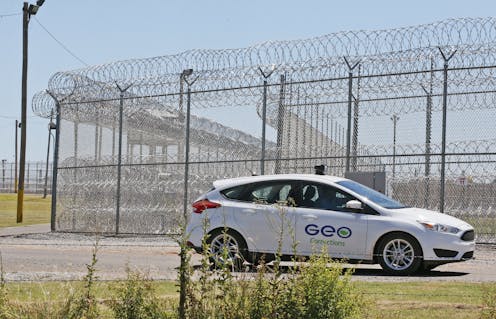Why are private prisons controversial? 3 questions answered
- Written by John M. Eason, Associate Professor of Sociology, University of Wisconsin-Madison

Editor’s note: Private prisons[1] have long stirred controversy[2], most recently over their role[3] in housing undocumented immigrants and asylum seekers at the U.S.-Mexico border. Several states have banned them[4], several banks have vowed to stop financing[5] them and more than one presidential candidate has pledged[6] to end them at the federal level[7].
John M. Eason[8], associate professor of sociology at the University of Wisconsin-Madison, has done extensive research on private prisons. We asked him to provide some background on why they’re so controversial.
1. What are private prisons?
Private prisons are run or owned by corporations[9] holding contracts with federal or state governments to house citizens convicted of a crime or immigrant detainees being processed for deportation.
The U.S. is one of only a handful of countries[10] in the developed world that allow private entities to own prisons. Critics of private prisons point out that profit motives, coupled with a lack of oversight, can create incentives to minimize costs and care for inmates[11].
In 2014, roughly 8% – or 128,000 of 1.6 million U.S. prisoners[12] – were held in private facilities. While only 13.5% of the 1,663 U.S. prisons are private[13], more than 55% of the 206 immigrant detention centers are.
From 2000 to 2009[14] the number of inmates in private prisons increased significantly[15], but the trend has leveled out[16]. Overall, the rate of prison building has decreased significantly since 2000[17] and nearly 100 facilities have closed nationwide[18].
Some populous states like Connecticut, Michigan and Mississippi have slowed their rate of imprisonment, but in southern states like Texas, Florida and Georgia inmate populations are level or continuing to rise[19].
My recent research[20] suggests that the number of prisoners has stagnated because we are not constructing new prisons. In the past, rising rates of incarceration was an outgrowth[21] of the prison building boom.
Some states like New York have begun closing private facilities[22]. Even some formally “tough on crime” groups have applauded these moves as fiscally responsible[23].
2. Where are they built?
The U.S. began building private prison in 1983. From 1995 to 2000, nearly one in four U.S. prisons opened were private. Texas, Florida and Georgia together built 336 facilities or 20% of all U.S. prisons.
New Mexico houses almost half of its prisoners in private facilities. Texas has the largest population of private prisoners.
Southern communities were three times more likely to build a prison[24] during the height of the boom than any other. Prisons are most often built in poor communities of color.
Overall, the rate of prison building has decreased since 2000[25]. The trend in new private prison building coincided with nearly 100 public facilities closing nationwide[26].
3. Why are they controversial?
Those who argue for privatization say that it delivers services at lower costs, but studies show[27] that gains in efficiency often comes with unintended consequences.
For example, less accountability in private prisons leads to more abuse of inmates. Food services have delivered food laced with maggots[28]. Prison food service, now dominated by private vendors, has been labeled by critics “a hidden public-health crisis[29].”
Many anti-privatization advocates believe that private operators are rife with exploitation[30]. Almost all private prisons are operated by five companies[31] and Corrections Corporation of America controls more than half the market with 53% of all facilities.
Private prisons have surfaced as an issue in[32] the 2020 presidential election[33], and the country may soon see further reform of private U.S. prisons.
[ Like what you’ve read? Want more? Sign up for The Conversation’s daily newsletter[34]. ]
References
- ^ Private prisons (www.motherjones.com)
- ^ long stirred controversy (civilrights.findlaw.com)
- ^ over their role (www.npr.org)
- ^ Several states have banned them (www.axios.com)
- ^ have vowed to stop financing (www.reuters.com)
- ^ presidential candidate has pledged (www.phillytrib.com)
- ^ end them at the federal level (thehill.com)
- ^ John M. Eason (www.johneason.com)
- ^ run or owned by corporations (www.hamiltonproject.org)
- ^ one of only a handful of countries (www.brennancenter.org)
- ^ minimize costs and care for inmates (publicpolicy.wharton.upenn.edu)
- ^ 128,000 of 1.6 million U.S. prisoners (www.bjs.gov)
- ^ 13.5% of the 1,663 U.S. prisons are private (www.johneason.com)
- ^ 2000 to 2009 (www.motherjones.com)
- ^ increased significantly (www.motherjones.com)
- ^ the trend has leveled out (www.cbsnews.com)
- ^ decreased significantly since 2000 (www.johneason.com)
- ^ 100 facilities have closed nationwide (www.worldcat.org)
- ^ inmate populations are level or continuing to rise (www.sentencingproject.org)
- ^ My recent research (www.johneason.com)
- ^ rising rates of incarceration was an outgrowth (www.johneason.com)
- ^ have begun closing private facilities (www.forbes.com)
- ^ fiscally responsible (www.houstonchronicle.com)
- ^ three times more likely to build a prison (www.sciencedirect.com)
- ^ decreased since 2000 (www.johneason.com)
- ^ nearly 100 public facilities closing nationwide (rowman.com)
- ^ studies show (www.brennancenter.org)
- ^ food laced with maggots (www.usatoday.com)
- ^ a hidden public-health crisis (www.theatlantic.com)
- ^ rife with exploitation (www.axios.com)
- ^ operated by five companies (www.hamiltonproject.org)
- ^ issue in (www.eastbaytimes.com)
- ^ 2020 presidential election (slate.com)
- ^ Sign up for The Conversation’s daily newsletter (theconversation.com)
Authors: John M. Eason, Associate Professor of Sociology, University of Wisconsin-Madison
Read more http://theconversation.com/why-are-private-prisons-controversial-3-questions-answered-116774

